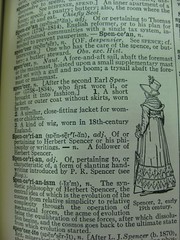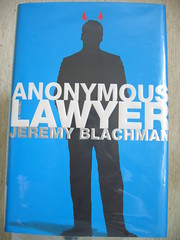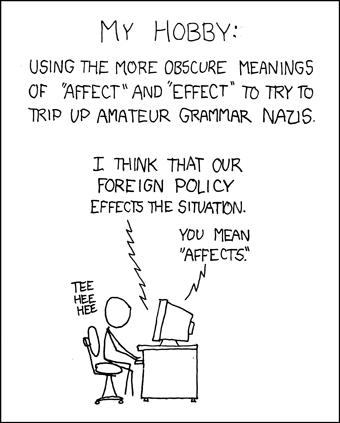Confession time!
I totally use a thesaurus. Even while drafting. If I’m repeating a word too much and I just know there’s an easy synonym (it’s that tip-of-the-tongue syndrome!), words that are so quick and easy that they’re in the standard word processor thesaurus, I look them up. And if you’ve got a good thesaurus, it’s fun to gambol in the Word Nerd-ery sometimes.
But I’ve also seen thesaurus use gone bad, and I’ve learned the hard way that the thesaurus isn’t always your friend. (Seriously, scarred for life. I was like 11 and it’s so embarrassing, I still can’t share it.)
 Thesauruses: the good, the bad and the ugly
Thesauruses: the good, the bad and the ugly
With my affection for thesauruses, I was excited to read Arthur Plotnik’s Spunk & Bite [affiliate link] chapter reveling in thesauruses. He gives some excellent tips on using thesauruses wisely:
- Understand Roget’s’ possibilities. Use a thesaurus to
- discover more fitting or more forceful words;
- find those good words you can’t quite recall [hello!];
- avoid repetition of words [oh yeah];
- escape clichés and worn modifiers;
- help describe the so-called indescribable;
- refine your intended meanings (via related concepts); and
- simply luxuriate in the plenitude of language.
- But understand Roget’s‘ limits
- Before embracing an unfamiliar word, look up its definition and usage in a good dictionary.
- Don’t fish in the categories, swim in them.
- Don’t grab all the words that fit.
- Search your brain as well. [He recommends flipping to a section that has nothing to do with the subject at hand, like describing light using words from the “Violence” section: savage, brutal, etc.]
- Use new and/or older editions.
- Take chances.
(77-78)
 What’s my favorite thesaurus? I happened to find an Oxford American Writer’s Thesaurus [affiliate link] at a local thrift store (I agonized over the $3, but it’s so worth it!). It’s got fun little asides by famous authors for some of the words, fantastic breadth—I love this thing.
What’s my favorite thesaurus? I happened to find an Oxford American Writer’s Thesaurus [affiliate link] at a local thrift store (I agonized over the $3, but it’s so worth it!). It’s got fun little asides by famous authors for some of the words, fantastic breadth—I love this thing.
Of course, we all know the difference between the right word and the wrong word is the difference between lightning and a lightning bug—and thesauruses alone can’t tell us if a word is truly the right one. But relying on Plotnik’s tips is one good way to make sure we get a good start from thesauruses.
The Naming of Things
Plotnik also recommends another way to find the perfect word: finding the right name for things. Visual dictionaries and word lists are the best tools for these things, with terminology for very specific things arranged by subject. If you need to set a scene or use industry-specific terms, check out one of these resources that Plotnik recommends:

The “Right” Word
But as with thesauruses, just knowing the “right” word doesn’t necessary make it the right word (tautology FTW!). When we look up an obscure term for our research in our setting, it might be right in the sense that it describes it accurately—but even if it’s right in that sense, if your audience doesn’t know the term, it won’t help them visualize it. Then is it “right”?
In a day of instant information, readers really do put down books to look stuff up. I even documented a time I did that here on the blog: a novel I was reading named an obscure medical device, as if that would be enough for us to picture it being used as a weapon. It was not, I opined, the right word because I couldn’t visualize the pivotal weapon throughout the scene and, frustrated, put the book down to hop on the Internet. (And being me, it was some time before I got back to it, most likely.)
As a writer, I went through this with the word “inveigle” in one manuscript (okay, since we’re confessing: I’ve been through it a lot in pretty much every manuscript, but this is one of my stories). I found it in a thesaurus and the definition looked right.
I decided to ignore the fact that pretty much everyone I had read it—intelligent, college-educated people who really like me—tripped over that word and pointed it out. It was Capital-R-Right and nobody was going to convince me otherwise. After all, isn’t reading how we grow our vocabularies? Didn’t I see, like, one blog comment once where someone said they liked a book to teach them some new words??
If the logic sounds tenuous, it was. Finally, after yet another friend mentioned that word, I went on a hunt for that word in the wild. This is something you should always do with new words. (Google, how I love you.)
And what did I find? It seemed to have a connotation I definitely didn’t want there. It hurt, but I cut that word—because it wasn’t as right as I thought. And since then, I’ve cut a few more words that might send readers running for their dictionaries—because I don’t want to pull them out of the story, but mostly because they weren’t in the characters’ voices anyway.
I’m getting better about this: in my current WIP, the characters use a tombolo to get to the final confrontation spot. Oddly enough, tombolo is one of the examples of obscure, precise terms that Plotnik uses in the visual dictionary chapter of Spunk & Bite (page 210). I felt pretty chuffed to know the term already (and was even able to list an example!).
And that’s one of the dangers of using these kinds of terms. If you know this secret, fancy argot, you get to sound smart and feel self-satisfied. Otherwise, you’re probably thinking: A whatsiwhato? Plotnik defines the term in his book, but most novelists don’t send their characters running for a dictionary or factual lesson/as-you-know-Bob in mid-story. (And aren’t you glad?)
And you’re probably still not sure what a tombolo is, huh? If you’ve gotten annoyed enough to go look it up—well, thanks for coming back. That’s more than most readers would probably do, especially on the Internet.
A tombolo is a sandbar that connects a former island to the mainland. Yes, it’s one word that can elegantly replace a somewhat awkward, 9-word explanation. But when that one word doesn’t illustrate, only obfuscates, your meaning, is it “right”?
(I should note that I’m definitely not fully cured: I’m looking forward to bringing out a high-falutin’ voice in a 19th century character in my current WIP.  )
)
Naturally, you can go too far with this. My best friend was critiqued in a college class and one member of the class took issue with a word he didn’t know in her manuscript. This critiquer was convinced she should take it out because that word took him out of the story and frustrated him as he read. The word? Betrothed.
Not exactly an astrophysics term. Similarly, I’ve had readers have a problem with “C.I.” (confidential informant, used in a police procedural mystery), “frosted” referring to highlighted hair, and the adjectival drawn. I think they’re fairly transparent. We don’t have to write for the lowest common denominator—as long as we don’t write over the average readers’ heads. (As for determining who’s average in your audience . . . sorry, that’s up to you!)
To sum up, the right word:
- has the right definition (denotation)
- is as vivid, powerful and succinct as the context needs
- carries the right connotation
- is right for the character’s voice
- is right for the general reader
You can get away with breaking maaaybe one of those axioms with a word, and even then, you shouldn’t do that too frequently—so choose carefully. And remember that every time your reader has to set your book down to look up an obscure term to try to picture what you’re writing, there’s a better and better chance that he won’t pick it up again, frustrated that you keep talking over his head and make it impossible for him to visualize your story.
What do you think? What does it take to make the “right” word Right?
Photos by Harry, noricum, and Greeblie, respectively
 Notice, though, that in English, when we use a paraphrastic tense, only ONE verb carries the tense: “I did go to the store,” not “I did went to the store” (or, to get crazy with it, “I did wanted went to the store.”). Naturally, in forming past tense questions, we also split the past marker off: “Did you go to the store?” not “Did you went to the store?”
Notice, though, that in English, when we use a paraphrastic tense, only ONE verb carries the tense: “I did go to the store,” not “I did went to the store” (or, to get crazy with it, “I did wanted went to the store.”). Naturally, in forming past tense questions, we also split the past marker off: “Did you go to the store?” not “Did you went to the store?”



 )
)

